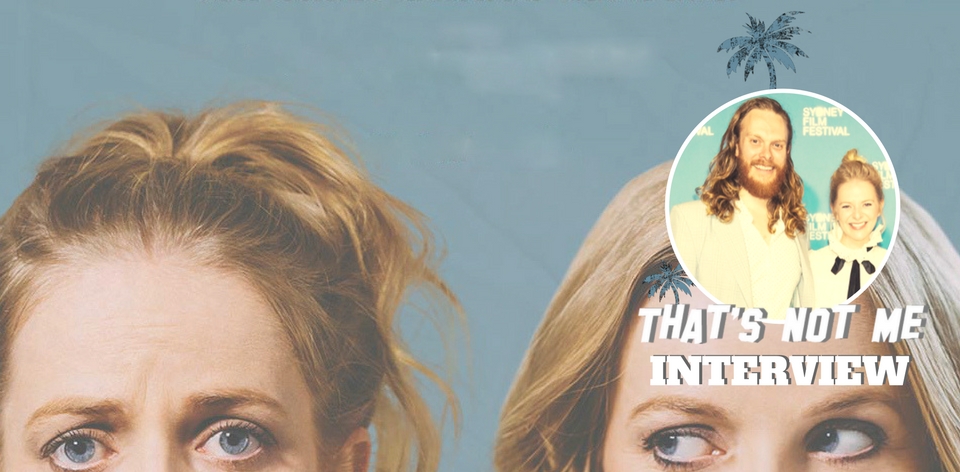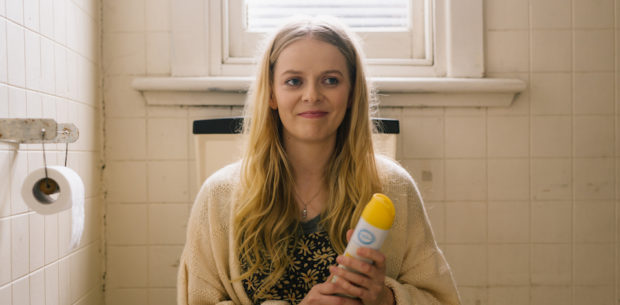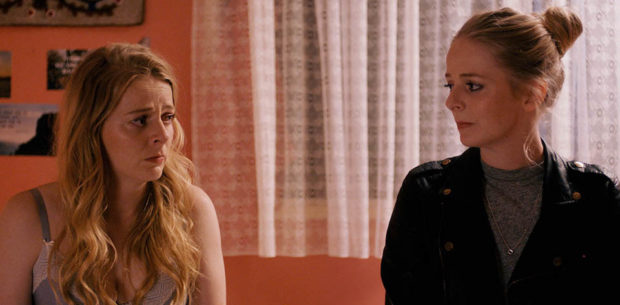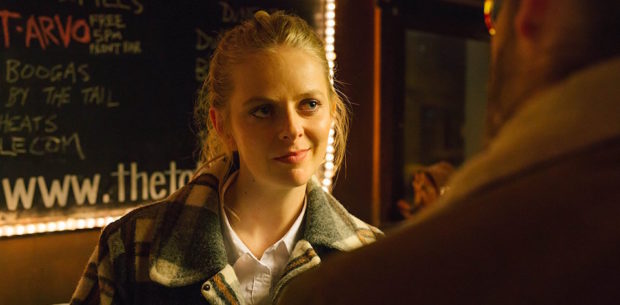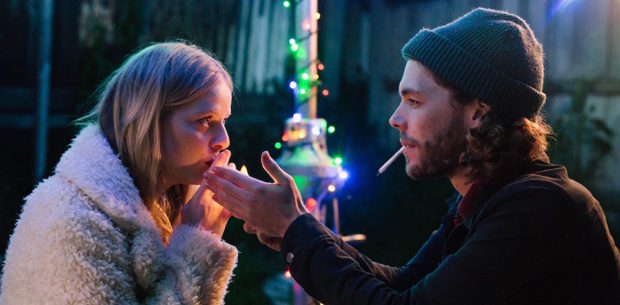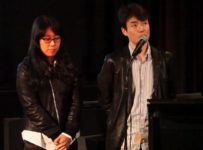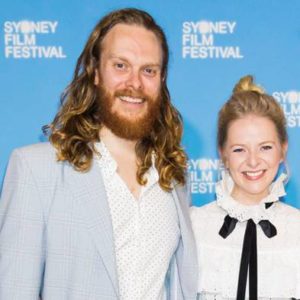 “We talk a lot,” Gregory Erdstein, co-writer and director of THAT’S NOT ME, lets me know after the interview. He and co-writer/star/producer Alice Foulcher have a lot to talk about.
“We talk a lot,” Gregory Erdstein, co-writer and director of THAT’S NOT ME, lets me know after the interview. He and co-writer/star/producer Alice Foulcher have a lot to talk about.
Since its debut at the Santa Barbara International Film Festival in February, and the subsequent Australian premiere at the Sydney Film Festival 2017, the Australian comedy has been riding on a wave of good vibes from audiences lucky enough to catch it. The rest of Australia can look forward to its national release on 7 September.
A character based piece that showcases the talents of Foulcher, the film is an unlikely comedy about failing and finding your place in the world. In the film, Polly (played by Foulcher) dreams of being a big Hollywood star, but her efforts are partly self-sabotaged by her terminal indecision. It also doesn’t help that her identical twin sister Amy has just landed an HBO series opposite Jared Leto.
Chatting with Alice and Gregory, it’s clear that the film we called a “heartfelt and quirky Aussie comedy” has been as much of a creative arc for the filmmakers as it was for the characters on screen.
You have both been working together, on and off screen, for a while now. After a number of shorts, what inspired this as a feature?
Gregory: It was actually after we’d made a short, and we were at a festival that screened one of our shorts. We saw another film in the program with an actor that we knew of, and we were discussing that actor afterwards and the film. I said to Alice, ‘Are you sure it’s not their twin?’ The last time we saw that actor, Alice had said ‘I saw you on a billboard the other day’ and they said ‘No, that’s actually my twin.’ Sure enough, it was actually the twin in the film as well. I guess that was the kernel of the idea of what it would be like if you were in a profession where your entire currency was what you looked like and who you were, and if there was someone out there doing work that you weren’t proud of or work that you actually wanted yourself. That was kind of the beginning of it.
Alice: Yeah, it kind of started there, but it also became a really good idea for our first feature because it became something that we could explore why we were even making films in the first place. So it became a bit about that quarter-life crisis, feeling that we were part of a generation that’s been raised to believe, for better of worse, that we could do or be whatever we want and then having to reassess those dreams. So it was kind of thematically the right film for us to be doing at a big time in our life as well. We were ready to step up and go from short films to features, but I guess to go through the more traditional funding bodies we would have had to of had that calling card short film that had been somewhere like Cannes or Sundance or something like that. We didn’t have that, and we thought short filmmakers are spending almost the same amount that we spent on our feature on short. We thought we could try and make that calling card short, but there’s no guarantee that it’s going to get into an A-List festival. In fact, it’s pretty unlikely statistically. So we thought we may as well make that first film and see if we actually enjoyed doing the thing long form anyway. With short films you might spend two days on set a year, whereas we didn’t actually know if we enjoyed doing it in a longer form. It wasn’t just a calling card film, but also a great opportunity to see if we enjoyed directing, writing, acting on a feature length scale. You can really only make that film once, because you’re calling in so many favours. So I think we’re quite lucky that we’re happy with the end product, and that it’s done as well as it has as well.
Gregory: I was actually just listening to Alice then thinking there’s actually no guarantee that a feature would ever get into any of those festivals either, so what the hell were we thinking? [laughs].
Alice: We just wanted to see if we enjoyed doing it in a longer format, and we really did. That’s the fun thing about comedy as well, and the fact that we’re a low-budget film, it meant we could work with whoever we wanted to work with. So we’d turn up on set every day with a punch of our friends, so it’s actually enjoyable, and because it’s comedy we’re actually having fun. It was actually a good experience, which is not all that common in filmmaking [laughs].
So you mentioned there the money you would have spent on shorts, but you’re budget was relatively low. How important was it to get all the elements you wanted in there at the script stage?
Gregory: I think that one of the things we learned from the shorts we had been making together, and the style we had developed with those shorts, that they were quite cheap shorts to make. That was a really good thing, and a negative I suppose. The good thing was we developed a style where we could make at least one short film a year and keep in practice. The bad thing was, they weren’t the spectacle that was expected at big festivals. They were most just about ideas and dialogue…
Alice: …and relationships…
Gregory: …and relationships and characters. So I think that was also something. It’s harder to get people excited about that in a long-form feature, or to put money into that. People want to see spectacle when it comes to putting money into funded features.
Alice: To be fair, we didn’t even try to get funding.
Gregory: Yeah, we didn’t even try. I think we definitely spent quite a lot of time on the script, over a year. Semi-full-time on the script, trying to make sure it was right. We had a script editor, Aaron Hawke, who was excellent in kind of interrogating the script and making sure it worked. We showed it to a couple of people, we were very selective about who we showed it to.
Alice: You can’t get too many opinions.
Gregory: You don’t want to get too many opinion. We showed it to people we trusted, and a couple of people we didn’t know. The film director Claire McCarthy, who directed The Waiting City. We didn’t actually know her, but Isabel Lucas put us in touch with her, and she was very generous with her time in reading and offering some pretty good notes that we acted on. We also did a table reading as well quite early on the process which helped us tone the dialogue a little bit more.
Alice: We definitely did write it with a lower budget in mind. So we didn’t write a science fiction film or a period piece or anything like that. I think the luxury item in it was the trip to L.A. We did write something that was four walls, dialogue-driven, character-driven, without that big spectacle or special effects element in it. Even the L.A. stuff we did as cheaply as we could. All scenes we did together are actually shot in Melbourne, and the stuff that’s actually shot in L.A. was just me, Greg, the DOP Shelley Farthing-Dawe…We just went over for a week and shot a bunch of stuff.
You talked about L.A. Disappointing travel has been a theme for your last few short films at least. Was it important to go to L.A. for those exterior scenes? Do you think you could have faked it?
Both: No.
Alice: We wanted to show the sights, but not in that fantasy glamourised version of L.A. We wanted it to be the mundaneness of L.A. We had someone tell us that the Frankston stuff looks more glamourised than the L.A. stuff, which I kind of love. [Laughs]
Gregory: I think also that the thing we were very conscious of with our limited budget is that if we were going to be spending money, it had to be ‘value adding’ on the screen. It had to multiply substantially. So there were only a couple of locations where we had to pay location fees. If we had to pay hundreds of dollars for a location, we wanted to make sure that it seemed like thousands of dollars. For a long time, we were hoping that we’d be able to just shoot the film and someone would just give us the money to go over to L.A. [both laugh] In the end it was just, well, it was going to be expensive to get this part shot, but it’s actually going to look like the film is worth ten or a hundred times more than it is if we just spend this small amount of money. So I think that was the trade off we were willing to make.
Alice: We really wanted to feel like we went to L.A. and we shot all that stuff.
That begs the question though, if you had a bigger budget, is there anything that you would have done differently?
Gregory: Explosions, car chases…we would have gone to the moon instead of L.A.
Alice: [laughs] But if we’d had luxury, I guess, there was a scene that we had at the end that we thought about filming for a long time. It was in the script right up until the edit when we decided we didn’t need it. I’m glad it ends where it does end. We did have this funny scene where it was six months or a year in the future, Amy’s winning her Oscar for her Sofia Coppola film and Polly’s there as her date. She’s at a bar at the back of the Oscars talking to Danny DeVito and we thought that would be really funny. So that was the dream, but it was never going to happen really.
Save it for the sequel then. So several films get name-checked, there’s a lot of meta-references in this. It’s A Wonderful Life is obviously the most prominently referenced film in there. Did you look to anything stylistically, either of you, in the creation process?
Gregory: I think the films of Noah Baumbach. He has a style that lends itself well to low-budget filmmaking, but also I think his films for us – even though they’re low-budget in monetary terms – they pack such a powerful emotional punch. He also does it with humour as well. The Squid and the Whale is both tremendously funny and tremendously tragic film. There’s so much darkness in that film. I’m just thinking about the scene where he’s trying to convince his counsellor that he could have written that Pink Floyd song. It’s hilarious that scene, but at the same time there’s just so much darkness in there. Frances Ha as well. When you’re trying to find truth in storytelling, truth on the screen, to us that’s the truth of life. There’s nothing ever wholly serious, and there’s nothing that’s ever wholly funny. You kind of use equal amounts of each to balance out the other. So I find that filmmaking is that perfect…
Alice: ..balance…
Gregory: …it’s perfectly balanced, and it’s also perfectly accessible as a starting point for first time independent filmmakers.
Alice: Also, probably Alexander Payne, I would say. Sideways is another film that treads that line beautifully with tragedy and comedy. I personally want to see more female characters of that ilk, whether it’s that Paul Giamiatti type or Ben Stiller in Greenberg. That’s why I love Frances Ha as well, because I feel that we don’t often get to see those complicated late 30s, early 40s female characters in comedies on screen.
Gregory: Who are kind of unlikable.
Alice. Who are kind of unlikable! It’s funny because we used test screening on the film, and there was this one test screening where we got a couple of pieces of feedback saying that Polly was selfish and unlikable. It came from male viewers. It got us thinking about how we are so willing as women, when we watch Greenberg or Sideways, to put ourselves in the lead character’s shoes even though they’re male. Whereas personally I think that men are more raised to not put themselves in a female characters shoes, but rather see them as the love interest or a sister or mother. The perfect example is Disney films. When we watch Peter Pan or Aladdin, and we think of ourselves as Peter Pan or Aladdin, I don’t think that many young boys were watching The Little Mermaid or Beauty and the Beast and putting themselves in Belle or Ariel’s shoes.
Well…
Alice: Unless you were, then congratulations. [laughs]
I wanted to be part of their world, dammit.
Alice: Awwww! Actually, The Little Mermaid was the first film I saw at the cinema. Yes, I want to see more females – particularly in Australia, particularly in comedy, film and TV – more female lead characters. Because I can’t think of a whole lot since Muriel’s Wedding that have really broken through.
Actually, sort of related to that, in terms of you and your relationship to Polly: since seeing the film, Alice, there’s been about two or 3 commercials I’ve spotted you in that are currently playing in Australia.
Gregory: She’s doing research for the role two years after the fact.
[Laughs] So how close are you to Polly after this process, or has it given you a whole new perspective on your character?
Alice: It has given me a whole new perspective. To be honest, I only got an agent part way through shooting the film. I thought of myself as a writer and a director and as a performer, but I hadn’t really been pursuing it very strongly. So I had been more Polly in that kind of way, in that I haven’t been actively looking for the work. Whereas now that I’ve got an agent and I get auditions, absolutely I do commercials. I would never be a Polly in that way. It’s great work, it’s fun. I mean, both of those ads I did this year, they pay well, they’re heaps of fun, they’re only a couple of days work. So I’m all for it. I’ve auditioned for Neighbours, I’m not snobbish about that at all. I guess I don’t want to be Polly in that way, even though I understand where she’s coming from. I think Amy is a better role model in the sense of saying yes to opportunities as they arrive. But I think I have been more like Polly. I feel closer to her and her story.
Gregory: On the day of the screening in Sydney, we actually had this bizarre experience where we we went to do a tech check at George [Street] cinemas, and we were waiting at Central to get back home. Alice is standing is standing in front of one of those giant electric billboards, and her face comes on the screen similar to how it is in the film where this giant billboard of her. It was a very surreal.
Alice: I’ve had more people recognise me for the Origin Energy ad than anything else, that’s for sure.
Well, hopefully that changes next month when the film’s released. There’s a couple of loving digs in the script though about Australian films and filmmaking. I think Polly actually says at one point “I don’t really watch Australian films.” Is there a stark truth behind those gags that you’re pointing at the local industry.
Gregory: I think for Polly, for her character to say that, it’s more about people who want to make it big in filmmaking or acting and but they don’t actually engage in the local industry. They have this expectation that ‘When I make my thing, that’s when people will come along as see Australian films and watch Australian TV.’ That whole cultural cringe you hear about every couple of years when there’s an article eulogising the state of the Australian film industry. It is really tough to get people to see Australian films, let alone Australian comedies as we’ll hopefully not find out. We’re hustling every day for the last two/three months. I think I was saying then, and I don’t know where I heard it from, but it seems to be resonating with audiences every time I mention it in a Q &A. It’s that you need four people to tell you to go and see an Australian film, and every time I say that there’s an audible ‘oh yeah…’ because people are mentally doing the maths. That person in my Facebook feed, or when I was having a coffee with my friend and they mentioned, or that person at work. Usually the last person is your mum saying ‘Have you gone and seen Lion? You should probably go and see Lion.’ So you’re like ‘Alright, I’ll go and see Lion.’ It is kind of true, it is really hard to get people to see Australian films. It’s not so much a dig but a sad truth about a certain type of Polly in the worlds that we move in. They want to work in the industry, but they won’t support the industry.
Alice: And it’s a shame. The other day I was saying I was watching the Australian David Stratton doco, Cinematic Life. I was really blown away looking at the history of Australian cinema in one sitting. For a country our size and our population size, we punch well above our weight. We’ve produced not just films, but the talent as well when you look at the actors, and directors and cinematographers. We have produced so much talent in this country. Apparently it’s not just an Australian thing to have that tall poppy, cultural cringe attitude. Apparently it’s prevalent in New Zealand, England, Scotland, Ireland. It is something that we’re working against, and because we’re indie as well. We’re not just an Australian film but we’re an indie film as well, so that means we must be very low budget and therefore not as good. When in fact I don’t think we look low budget. Also it’s a comedy, and people expect a certain flavour from an Australian comedy that might be a little more outdated. Whereas, there are interesting things that interesting things happening, whether it’s Please Like Me, The Family Law, and Ali’s Wedding as well. There’s a lot of fantastic films being made, it’s just getting people to come see it. Particularly in our industry, we have that kind of competitive attitude because it’s like I was saying for female actors. When there’s fewer roles or there’s fewer funding opportunities, we become more competitive with each other.
Whereas there’s been really nice things since the Sydney Film Festival, where we only just met Osamah Sami and the makers of Ali’s Wedding there, yet they seem to be complimenting us a lot on Instagram and Twitter when they really don’t have to at all. The other day, Osamah Sami was at The Age Critics Awards accepting the award for Ali’s Wedding at MIFF, and at the same time he’s putting up an Instagram video of our poster saying ‘if you see one film this spring, make it THAT’S NOT ME. Then he clicks across to his poster, and says ‘if you see two films, make it Ali’s Wedding.’ It’s this really nice idea of – what did he say? A rising tide lifting all the ships. I think we have to have each other’s backs a bit, and support each other. Rather than thinking ‘If someone goes to see Ali’s Wedding, then they won’t come to see THAT’S NOT ME the next week. When in fact, if people come and see Ali’s Wedding and realise how fantastic it is, they’re more likely to put their faith in Australian cinema on the whole.
On that note then, this has now toured various film festivals around Australia and it releases nationally on September 7. Now that this process of touring and talking about the film is almost over, have you got something planned for the next one?
Gregory: I’m going to become an accountant I think. No, we’ve got several ideas. It’s started to open some doors, w’eve been speaking to some producers in TV. I think the key for us is not to be Polly and be picky and choosy. I think because it is such a difficult thing getting anything made in this country, and getting to people to see stuff in this country, whenever the opportunities arise the key has always been that we just want to keep on working. We’ve got a couple of TV ideas, a couple of feature ideas, so it just depends on what the path of least resistance is from here on out. It’s certainly not as resistant as it was two years ago when we didn’t have a feature film under our belt.
Alice: And we want to stay here. We want to keep working in Australia. As much as we obviously we would take opportunities if they were overseas, it’s not that we have that dream of ‘Alright, let’s jump ship and move over to L.A.’ We very much want to keep making things here, and we want to see more of this style of comedy being made in Australia both on TV and on film.

